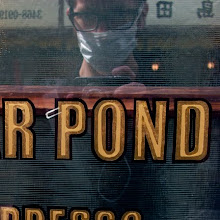Considering the Tsai Ming-Liang mini-retrospective @ the Asia Society, ending this weekend w/ a screening of his superior "What Time Is It There?" (2001) at 5p, I felt it appropriate to post my thoughts on essential contemporary director (who, along w/ Hou Hsiao-Hsien and Edward Yang, founded the Taiwanese New Wave). It's a drag the Asia Society didn't include Tsai's riveting "The Wayward Cloud" (2005) and "I Don't Want to Sleep Alone" (2006), which are both crucial for total appreciation of the director's oeuvre — esp. for the devoted viewer, who has traced lead actor Lee Kang-Sheng's maturation from the early days of punk wannabe ("Rebels of the Neon God", 1992) and emotionally fragile columbarium salesman ("Vive L'Amour", 1994). But hey, if you read my below text and dig it and attempt to track down Tsai's later (and regrettably rarer) works, then my work is done. So:
Tsai Ming-Liang — this guy is dope. you think of classic auteur directors who had their iconic recurring muses (Antonioni and Monica Vitti, Godard and Anna Karina, Truffaut and Jean-Pierre Leaud); now we have Tsai and his dynamic duo, Lee Kang-Sheng (Tsai's everyman who, depending on who you hear it from, may just be a bit like Tsai himself, onscreen) and Chen Shiang-Chyi (her incredible range from Lee's nameless fling in early film "The River" (1997) through her life-giving angelic power in recent film "I Don't Want to Sleep Alone" cannot be denied). Tsai is part of the 'Second New Wave' of Taiwanese film, which incl. Hou Hsiao-Hsien (whose oeuvre I love, more on that another time) and Edward Yang ("Yi Yi" is pretty close to essential viewing for any film buff), though Tsai was born in Malaysia. This is interesting as most of his films are set in big-city, highly industrialized Taipei expect for his latest "I Don't Want to Sleep Alone" (2006), which is set in similarly highly industrialized Kuala Lumpur — and most of the cast is Malaysian or Bangladeshi. This director is a proponent of long shots and static, atmospheric sound. The lengthy takes and pans are polarizing. Tsai newbies and fans of the MTV generation will undoubtedly be bored stiff, but if you take a moment and LOOK at what he's focusing on, you'll get it. Like the multi-minute-long tracking shot at the conclusion of "Vive L'Amour" (1994), following real estate agent Yang Kuei-Mei (she also stars as an unnamed songstress in "The Wayward Cloud") across a construction-razed park, up to an outdoor stadium, where she bursts into tears and the camera holds there patiently. Or like the fish-eye distorted static shot of the corridors in "The Wayward Cloud", as Chen first carts an enormous watermelon from one length of the frame to the other, then later drags a young comatose porn starlet from the lift to Chen's flat. Or the scene in "...Sleep Alone" where Lee (as migrant worker) sits in a dilapidated parking garage (centered around an enormous pond-like body of water), wearing a sarong, as a butterfly slowly moves into frame and alights on his shoulder. The sound bit is another, funny thing if you've seen his films from the earliest, "Rebels of the Neon God" (1992, with its dated-yet-cool pulsing Detroit techno soundtrack), through the present, you'll note the expansion of atmospheric sound over, say, soundtrack and even proper scripted dialogue! Oh there is a lot of 'speaking' in the loose trilogy of "What Time Is It There?" (2001, which is set partially in Paris and has a cameo by Jean-Pierre Leaud, perfect!!), "The Wayward Cloud" (2005, despite all its musical singalongs) and "...Sleep Alone", but much of this 'speaking' is either from the television, the radio, or overheard dialogue in crowded lunch halls and busy night streets. Lee and Chen are the leads in all three of these films but their scripted dialogue decreases dramatically in each. In fact, Lee says not a word in "...Sleep Alone" despite the fact he plays two people!! — a migrant worker and a comatose young man. And though this sort of makes sense as he's Taiwanese in Kuala Lumpur and doesn't speak the local tongue (and his other role is obviously nonspeaking, he's comatose), it is still of note. Chen doesn't say anything in "...Sleep Alone" either, but she cries once when her mother backhands her. Like 1/2 of "What Time..." is set in Paris, where Chen is visiting (for fun? for business? we never learn but she goes alone), and it's practically wordy by comparison. Chen meets up with a slightly older woman from Hong Kong, senses her kindred spirit, and tries making out with her (big mistake, Chen quickly learns). Meanwhile Lee is stuck in Taipei pining away for her. When "The Wayward Cloud" picks up, Chen is back in Taipei and Lee has become a porn star. Now SHE is desperately seeking him, and he plays it cool, to the point of standoffishness. It's tough to watch — you know she's really into him and he's not into her, but she doesn't get it and he's acting like a bastard. And then there's "...Sleep Alone", and Chen's dual role as caregiver to her comatose brother (Lee) and her blossoming relationship with grungy migrant worker (also Lee), who trails after her like a dog. They consummate, bringing full circle something that started nine years ago in "The River" (and jarred to consciousness violently at the conclusion of "The Wayward Cloud", and I'll write no more on that). And then we wonder, what's next for Tsai, Chen and Lee?

